Compton Cowboys are Special Guests
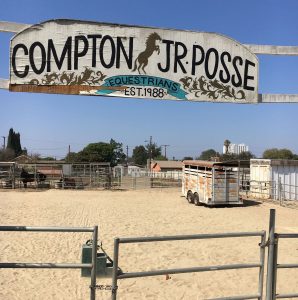
Stables of the Compton Jr. Posse in Compton, CA
BHPS Director Maddy Butcher writes:
Thanks to Patagonia Workwear’s generosity and Summit scholarships, two members of the Compton Cowboys, a Los Angeles group, will join fellow attendees next month in Durango.
The Compton Cowboys have been featured in a New York Times article and made waves in this viral Guinness spot.
Earlier this summer, I visited Compton and am happy to share this report:
Exit off Los Angeles’ Gardena Freeway. Turn left on Wilmington Avenue and then right on Caldwell. Drive past the 76 station, a rusted-out horse trailer with charro spray-painted on it, and a semi-abandoned Winnebago. Brake for a few chickens and a dog, then pull into an unmarked alley.
Walk away from the street and into another world. You can still hear occasional sirens and helicopters overhead. There are bars on the windows and plenty of concrete and chain link.
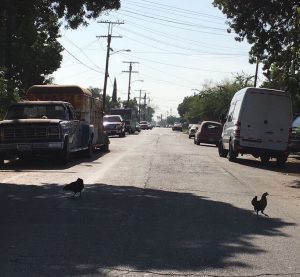
Caldwell Ave, in the neighborhood of RIchland Farms, Compton
But this half-acre space is home to horses. If not for the stable of horses at the Compton Junior Posse, a non-profit dedicated to offering riding activities to youth, the Compton Cowboys freely admit that their lives would have deviated to less positive paths.
Streets Raised Us. Horses Saved Us is the motto around here.
“Growing up in Compton, it’s pretty hit-or-miss,” said Tre Hosley, a bareback rider on the professional circuit (PRCA) and a horse trainer. “You take a good path or a bad path.”
Like all the Compton Cowboys I interviewed, Hosley has had experiences Compton is famous for. He spoke to me after attending the funeral for his cousin, Marcus, who was shot at a house on nearby Cypress Street.
Keiara Wade, a barrel racer who will attend the Summit, lost her younger brother to gang violence two and a half years ago.
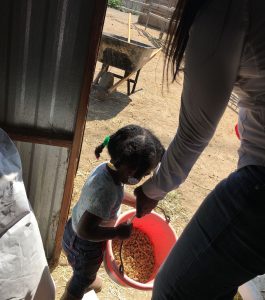
Keiara Wade hands her daughter treats for her mare
As a teenager, CJ Harris saw his friend shot and killed at a party. He added: “One uncle was killed. Another uncle was gunned down. A cousin was killed.“ His voice trails off. CJ will also attend the conference.
Compton wasn’t always so dangerous. Over one hundred years ago, it was a thriving agricultural community of about 500 people. Back then, Griffith Compton gave a generous parcel – now bounded roughly by Wilmington Avenue, Alameda Street, Greenleaf and Alondra Boulevards – to the county on the condition that it be agriculturally zoned. The neighborhood is called Richland Farms and is just a few miles from New Fashion Products, where Patagonia WorkWear denim clothing is sewn.
As recently as the 1950’s, Los Angeles was the largest agriculturally-developed county in the country. Now, it is the most urbanized – a reality that makes this neighborhood especially appreciated. You may not see a lot of white rail fencing, green grass, or open space, but Richland Farms residents are no less preoccupied with their livestock.
Nowadays, the tiny urban enclave attracts many Latino and black families who own and care for horses, goats, chickens, llamas, dogs, and others.
“Gangs are one subculture of many subcultures here in Compton. It’s not as bad as it once was,” said Randy Hook, who manages the group and is a member.
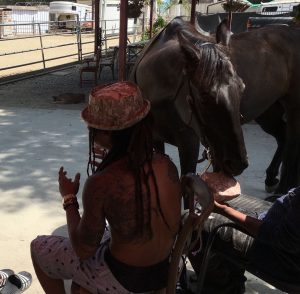
Kenneth “Stona” Atkins and his mare, Ebony
Hook graduated from Occidental College before completing his Masters in Music Administration and aims to reshape the organization. The Compton Cowboys is a brand collective, ready to bring their unique look and skill set to any variety of entertainment gigs, from fashion shoots to television commercials. Instead of fund raising in the traditional non-profit way, the group will direct money from their entertainment efforts to fuel the youth programs, he said.
None of that, of course, would have been possible without the horses and the connections and skills they begot. That history does not elude Hook and his friends as they listen to music and relax in lawn chairs.
“Once you get around horses, you start realizing what it is to be alive,” said Randy. “A lot of death and crime and stuff happens because you don’t appreciate that. You don’t appreciate breathing. Sun. Wind. Air.”
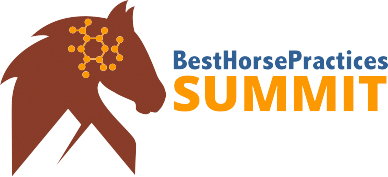
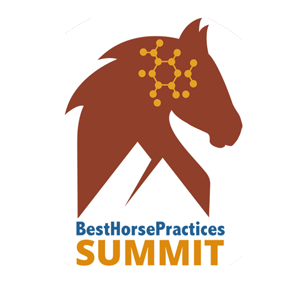
Great story!
I wish I had known that Compton Posse members were at the last Summit. I would have loved to interact with them — let them know that I am still available to them. Will any of them be coming to Maine this year?
My physical condition has deteriorated greatly since last October. I am staring at another surgery for my lumbar back, and being out of commission for about 6 months according to my surgeon. This doesn’t mean that I still couldn’t give ground school lessons, as I have in the past to the Posse adult administrators and advisors. Teach the adults how to pass this important first step in horse care so that they then can teach the children safe handling of horses. I guess it’s time to give Mayisha a call.
~~Stephanie